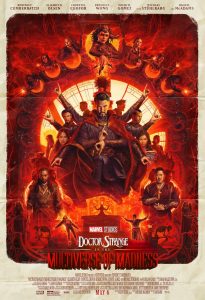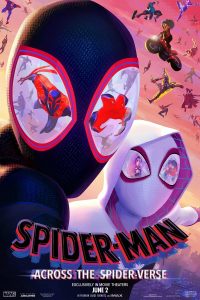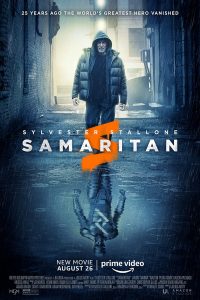Witchcraft & Wizardry: Arley Sorg and Josh Pearce Discuss Doctor Strange in the Multiverse of Madness
 It’s the third major movie this year premised on a fundamental misinterpretation* of quantum theory! (We also reviewed this one and this one, and there’s at least one more scheduled for later in 2022.) It’s also the third comic book/superhero movie we’ve reviewed this year (with many more on the way), and a sequel to a pretty average film in its own right. So, does Doctor Strange in the Multiverse of Madness stand out in any way?
It’s the third major movie this year premised on a fundamental misinterpretation* of quantum theory! (We also reviewed this one and this one, and there’s at least one more scheduled for later in 2022.) It’s also the third comic book/superhero movie we’ve reviewed this year (with many more on the way), and a sequel to a pretty average film in its own right. So, does Doctor Strange in the Multiverse of Madness stand out in any way?
Josh: I’ll start. I liked this movie way more than I expected to, but I didn’t like it quite as much as I wanted to.
Arley: The first Doctor Strange movie felt like they weren’t really doing a comic book movie, they were vaguely using a comic book character to make a movie that was more like Inception. It was very dependent on the visuals and changed so much about the comic book material that I had a hard time getting into it. This movie actually does a lot more comic book fan service. There are so many things about it that are pulled right from the comic books, and I was delighted by that. I think, of all the Marvel movies, this one was designed to appeal to comic book fans specifically. I was wondering how it would land for you because you don’t have that same background or that same interest, so how it lands for you depends purely on the movie rather than the fan service.
Josh: I only wanted to watch this because it’s directed by Sam Raimi, and all the distinctive Sam Raimi parts were great, but they kept getting interrupted by a Marvel movie. If you just edited out all the superhero stuff, or all the references to other Marvel movies, you’d have a really cool horror movie about a witch fighting a wizard.
Arley: I would call it a mid-range movie. Like, I enjoyed it, but I wouldn’t call it great or anything. And there were so many plot holes that it was like playing Whack-a-Mole.
Josh: I’m no longer engaging with Marvel movies on a plot level. I believe they’re presenting plot to us in bad faith. The story is not central to the movie. It’s all, “How can we introduce the next round of superhero characters? How can we tie it into the next product?” The plot means nothing to them, therefore it means nothing to me. So I’m just gonna skip over it completely, and I’ll leave it to you, if you want to talk about the plot on your own.
Arley: That’s fair. We’ve said this about movies before, but I do think this is one of those movies that if you overthink it — no, wait, not overthink — if you even think about it, it’s definitely gonna fall apart, but if you just go to watch it and have a good time, it’ll be pretty fun.
Boiled down, the story is Wanda Maximoff/Scarlet Witch (Elizabeth Olsen) searching for passage to an idealized parallel world in which she can live with her young sons (Jett Klyne and Julian Hilliard). The only way she can reach them is by absorbing the powers of America Chavez (Xochitl Gomez), who can punch pentagram-shaped portals between multiverses. The Doctor Stephen Strange (Benedict Cumberbatch) of “our” universe decides that Maximoff must be stopped.
Like how Stephen Strange took time getting used to being the Sorceror Supreme, Benedict Cumberbatch seems to have finally relaxed into the role of Strange, and even does a pretty good Ash Williams impression (which, in turn, is just an Elvis impression). Elizabeth Olsen remains one of the MCU’s most talented actors, and her scenes convey the dark rage and grief carried over from WandaVision, lending a surprising grimness to otherwise shallow material. America Chavez is clearly set up for roles in her own movies, and possibly to take on the mantle of Captain America. Overall, the performances shine through the lackluster writing. Rachel McAdams even throws herself into the campy scream queen scenes with little self-consciousness.
And there are surprise guest appearances!
Josh: I loved the Bruce Campbell cameos. I want to get your opinion on the two most notable scenes, which were probably the music fight and the Illuminati appearance.
Arley: The music fight was so cartoony, it was really pushing my tolerance. The way that Doctor Strange and Scarlet Witch use magic in the movies is wholly different from the way they do in the comic books, so that is kind of frustrating as a comic book fan. The music fight was also kind of random. There was no specific reason and there’s nothing that ties it to the rules of the world they’re in. I really liked it on an idea level. But execution, I was like, that’s cool. Too bad it’s not that great.
Josh: I thought it was at least creative, but like you said, very cartoonish. I don’t know how they do it in the comics, but I actually kind of enjoyed some of the magic use in this movie. Like Doctor Strange goes, “Now my arms are snakes!” or when Wanda uses the reflections to portal everywhere. It wasn’t just throwing energy bolts at each other the whole time.
This being the multiverse, how could the studio resist bringing in characters from all corners of the Marvel empire? There’s an alternate character from Captain Marvel, someone from the recently acquired X-Men film franchise, a character from a short-lived subsidiary TV show, a live-action version of an animated character from the What If…? mini-series, and a truly baffling casting choice from the ill-fortuned Fantastic Four properties. Similar to the bagel at the heart of Everything Everywhere All at Once, Marvel piles it on until the scene threatens to collapse in on itself.
Arley: The Illuminati thing: Again, as a comic book fan, I really enjoyed the idea of it because it actually taps into certain storylines that I’ve been dying for, and it had one of my all-time favorite characters. This edges closer to elements of the comic book version of The Infinity Gauntlet storyline than the movies. Some of my complaints involve like, this isn’t really how this battle with so and so would play out. You know, super nerdy and ultimately useless stuff. But the scene with their Captain Marvel was really cool. And seeing… what’s her name?
Josh: Captain Carter.
Arley: That whole fight scene was for me one of the best fight scenes in the movie. I was just like, really excited by it. It also filled me with grumbles, but it was still one of my favorite parts of the movie, you know?
Josh: Yeah, I just didn’t care about that Illuminati section at all. I don’t care who these people are. But it was good action, a different kind of action than was in the rest of the movie. It felt like it was coming from a different movie, like they pulled the whole scene from this other Marvel movie and said, “We’ll put it in here. And after, we’ll just continue on with the Doctor Strange movie.” Maybe in a different context, that’d be more interesting. Obviously, if you’re a fan, you need to see all these characters, and now they’re teasing that they’re going to show up further on in the MCU.
Arley: I do think that it’s not for everyone. My boyfriend was really bored, and he likes horror movies. He’ll tolerate superhero movies, but this one just did nothing for him. When I go to see these movies, just because I know the way that you and I watch movies is different from the way the average moviegoer does, oftentimes I’ll kind of tune in to what people in the theater are responding to and how they’re responding. There were a lot of moments that got responses from the audience. I mean that in a good way. Horror moments or moments of tension or whatever. Even moments that I was like, “Oh, this is messed up. This would never happen this way,” people who might not be comic book fans were still engaged by that moment, even though the moment threw me out of the movie. It does feel to me like this movie is kind of having an identity crisis that’s slightly unresolved. Like, it’s caught between, do I want to be a comic book movie or not? And it’s kind of half stepping in either direction, sort of like it’s trying to please everybody.
Doctor Strange in the Multiverse of Madness was written by Michael Waldron, who created the Loki Disney+ series (which also deals with branching realities) and served a stint on Rick and Morty, the show often regarded as the hyperaccumulator of all things multiverse.
The Everything Everywhere All at Once writers/directors even said, in an interview:
Kwan: As we were working on the movie, Spider-Man: Into the Spider-Verse came out. It was a little upsetting because we were like, “Oh shit, everyone’s going to beat us to this thing we’ve been working on.”
Scheinert: I feel like Rick and Morty was the first.
Kwan: Yeah. It was actually hard to watch because we had already been working on the draft for a while. Watching the second season of Rick and Morty was really painful. I was like, “They’ve already done all the ideas we thought were original!” It was a really frustrating experience. So I stopped watching Rick and Morty while we were writing this project.
Despite the infinite possibilities in infinite combinations that the fictional concept presents, multiverse movies tend to swirl around a handful of common themes: mourning, remorse, and regret; searching for the lost and the dead; a reckoning with the kind of person you have chosen to be. Multiverse of Madness hardly breaks that mold. With Wanda’s pursuit of America Chavez, Wanda’s potential threat to the whole of reality, and her insistence that, with this power, she can ease the suffering of countless people, the film almost sets up a “the needs of the many outweigh the needs of the few” (or the one) vs. “The Ones Who Walk Away from Omelas” ethical dilemma. Instead, the film concludes “HUMAN SACRIFICE BAD” and abandons any deeper examination.
The feeling that this is a Frankenstein movie is underlined by the number of film crews listed in the credits (including 2nd, splinter, New York, and Los Angeles units), a lot of people generating disjointed footage to later be stitched together by the editor (Raimi’s frequent collaborator Bob Murawski). Granted, that is the nature of modern blockbuster filmmaking, but just from stylistic consistency it’s easy to pick out which sequences Raimi was most involved in, and which were handed over to others.
There’s a lot of dialogue about “souls of the damned” and “go back to hell,” which feels more appropriate for a movie like Drag Me to Hell than established MCU cosmology** — trying to cram a square movie through a pentagram-shaped hole. This is Raimi fighting with one arm tied behind his back, but if Multiverse of Madness didn’t have such an eccentric director, it would have been flat mediocre, instead of punched up by stylistic moments.
Josh: I really liked the opening tentacle monster scene. When Doctor Strange is going after it with a spear, I thought, “Oh, okay, we’re doing The Suicide Squad again,” but then I laughed so hard at their follow-through. I was on board from that moment. The middle dragged, but it had some great moments, especially the first time Wanda possesses herself: the photograph turns its head to look at her, the liquid in her coffee cup turns into an ocean. All really creative stuff, setting up a creepy mood without being explicit. Then at the end, the movie just goes over the top into ridiculous horror, which is so great. They’re literally winking at the camera by that point.
Arley: A lot of Doctor Strange comic books are like horror comics, they draw inspiration from old horror movies and old horror books and stuff. He fights all these horror characters basically, in his titles. Even that opening scene, the tentacle monster is straight out of Dr. Strange comic books. There’s lots of really cool visuals. There’s lots of really cool ideas. It’s interesting because the CGI in this Doctor Strange movie, in a lot of scenes is not as good as the CGI in other Marvel movies. I mean, it looks cool, but also there are just times when it looks like a video game or, you know, you have that disconnection. I was watching the new Star Trek show and there’s a scene where a shuttle lands, and I thought, “Why does this shuttle scene look so good, but Doctor Strange looks almost cartoony?”
Josh: I’m glad you brought that up, because I wanted to talk specifically about the effects. I noticed it especially in the tentacle monster scene — it often looks like the depth of field or the focal length or something is not correct. It almost looks like it could be a stop-motion monster. This is obviously an ’80s horror throwback film, which you can tell from the title and the end credits graphic design, so I wonder if Sam Raimi — and this is Sam Raimi, so he just does weird shit anyway — if he purposefully toned down the quality of the CGI to give it an older movie effect. It actually helped me get into the movie quicker, because I recognized right away that we were doing camp, so I could approach it from that angle. There are several scene transitions that are throwbacks, too, with superimposed fade-ins. They look cheesy, but intentional, and I loved them. I don’t think Marvel was shortchanging this movie, especially in the effects department.
Everything Everywhere All at Once is, obviously, a better multiverse movie. Multiverse of Madness is a better Doctor Strange movie than Doctor Strange. Spider-Man: No Way Home is the better Marvel movie (and, arguably, best of the last several years), but What If…? is a better Marvel multiverse story. It’s a toss-up whether 2002’s Spider-Man or Multiverse of Madness is the better Sam Raimi comic book movie (the former is probably the better comic book movie, but the latter is the more “Sam Raimi” of the two). It remains to be seen where the upcoming Spider-Man: Across the Spider-Verse ultimately lands in this heap.
Arley: I’m not sure if this storyline is even really okay – I feel like it’s leaning into antiquated female tropes, such as female hysteria, and counterpositioning this against Doctor Strange as a “rational man” type. Not only is this a harmful narrative trope, but it’s something replayed over and over in actual life: men describing women as irrational or over emotional. I mean, yes, this storyline is tapping into a lot of comic book core material, but it’s potentially also sexist. The film tries to offset this by having other “strong” female characters, but none of the “strong” female characters are actually “strong female characters” if you examine them closely, if you look at agency of various kinds; they are kind of like props. It’s tough because by nature, this is a Doctor Strange movie, so he’s supposed to be the main character and hero. At the same time, these are all decisions that were made, and I’m not sure they were the best decisions possible.
is this a harmful narrative trope, but it’s something replayed over and over in actual life: men describing women as irrational or over emotional. I mean, yes, this storyline is tapping into a lot of comic book core material, but it’s potentially also sexist. The film tries to offset this by having other “strong” female characters, but none of the “strong” female characters are actually “strong female characters” if you examine them closely, if you look at agency of various kinds; they are kind of like props. It’s tough because by nature, this is a Doctor Strange movie, so he’s supposed to be the main character and hero. At the same time, these are all decisions that were made, and I’m not sure they were the best decisions possible.
Josh: Would you recommend it? I would, to campy horror fans, at least. I think I go into movies these days primed for the moment when I realize I’m wasting my time, but during this one I surprisingly found myself having a good time! I got a lot of genuine laughs out of it.
Arley: I would recommend it, hesitantly. It’s a good movie if you have nothing else better to do. If you can get past the possible sexism, and if you can ignore the plotholes. It’s probably better on the big screen, and… 25% more fun if you are a comic book fan. You know, if you’re out of movies to watch, go watch this one.
*Recommended reading: Helgoland by Carlo Rovelli
**Granted, these are norms in the comic books. But film and TV iterations sometimes attempt to hint at “scientific” explanations of stuff the comic books are content to simply call magic, or otherwise supernatural (the Agents of S.H.I.E.L.D. show describing the Ghost Rider character as a multi-dimensional phenomenon rather than from “Hell”, Asgardians as scientifically advanced to the point of appearing magical, and so on).
Directed by: Sam Raimi
Written by: Michael Waldron
Starring: Benedict Cumberbatch, Elizabeth Olsen, Chiwetel Ejiofor, Benedict Wong, Xochitl Gomez, Rachel McAdams, Jett Klyne & Julian Hilliard

JOSH PEARCE has stories and poetry in Analog, Asimov’s, Beneath Ceaseless Skies, Cast of Wonders, Clarkesworld, IGMS, Nature, and more. Find him on Twitter: @fictionaljosh, or at fictionaljosh.com. One time, Ken Jennings signed his chest.
ARLEY SORG, Senior Editor, has been part of the Locus crew since 2014. Arley is a 2022 Kate Wilhelm Solstice Award recipient, as well as a 2021 World Fantasy Award finalist and a 2022 Locus Award finalist for his work as co-Editor-in-Chief at Fantasy Magazine. He is a 2022 Ignyte Award finalist in two categories: for his work as a critic, and for his essay “What You Might Have Missed” in Uncanny Magazine. He is also Associate Editor and reviewer at Lightspeed & Nightmare magazines, columnist for The Magazine of Fantasy and Science Fiction, and interviewer at Clarkesworld Magazine. He grew up in England, Hawaii, and Colorado, and lives in Oakland, CA. A 2014 Odyssey Writing Workshop graduate, he can be found at arleysorg.com – where he has started his own “casual interview” series with authors and editors – and on Twitter (@arleysorg).
 While you are here, please take a moment to support Locus with a one-time or recurring donation. We rely on reader donations to keep the magazine and site going, and would like to keep the site paywall free, but WE NEED YOUR FINANCIAL SUPPORT to continue quality coverage of the science fiction and fantasy field.
While you are here, please take a moment to support Locus with a one-time or recurring donation. We rely on reader donations to keep the magazine and site going, and would like to keep the site paywall free, but WE NEED YOUR FINANCIAL SUPPORT to continue quality coverage of the science fiction and fantasy field.
©Locus Magazine. Copyrighted material may not be republished without permission of LSFF.






